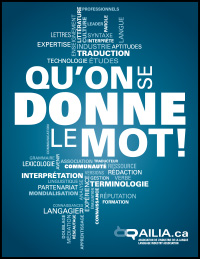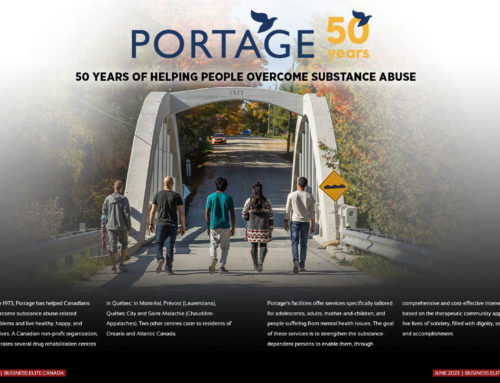Transforming Canada’s Linguistic Marketplace
By Rajitha Sivakumaran
In 2011, Statistics Canada reported that over 200 languages are spoken in Canada and 80 per cent of those who spoke a second language live in the nation’s largest metropolitan areas. Toronto, for example, is home to a staggering 140 different languages. Moreover, Canada is a bilingual country; by law the population must be served by English and French.
Accompanying this vast amount of linguistic diversity is a great responsibility to ensure communication with every Canadian, regardless of their fluency in English and/or French. Certain regulations like universal health care need to be accessible equally to all Canadian citizens. Legal services function in a similar manner; the right to an interpreter is obligatory. What’s causing a stir is the lack of standardization across all agencies in the translation and interpretation business. What’s undersold is the risk involved in providing second-rate translations and interpretations.
“Canada, being such a diverse country where 50 per cent of the Toronto population has a second language, there has to be an industry to support quality services to those people and this applies to the official languages and multilingual languages,” said Lola Bendana, president of the not-for-profit organization, Association de l’Industrie de la Langue or Language Industry Association (AILIA).
Defining quality service — that’s where AILIA enters the picture. According to Bendana, anybody can set up shop as a translation agency. Because the barrier to entry is very limited, there are approximately 800 to 1,000 translation or interpretation agencies in Canada. “People think that if you speak the language, you’re able to translate and interpret. That is absolutely amiss. You have to have certain credentials in order to do that,” she said.
In the past 20 years, the language industry has made significant strides towards standardization, and AILIA has been the driving force behind this movement. In fact, over the past 10 years, AILIA has transformed the Canadian language industry by creating national standards for translating and interpreting.
“I think it is very noteworthy to say that in fact there are no other countries that have created their own national standards in translation and interpretation,” said Maryse Benhoff, vice president of AILIA. Although guidelines, technical papers and tons of literature are accessible to the rest of the world, Canada stands out as the only nation to have created a standard for the process of translation and interpretation.
Recognizing translation as a profession
The trend that Bendana has been seeing for the past 15 years is the rising awareness that translation and interpretation are indeed careers that requires a certain level of training.
“On the one hand, clients are starting to realize that there is the need for a professional. On the other hand, they don’t quite yet know how to recognize it all the time,” Benhoff said, adding that although translation and interpretation are becoming more popularized, clients don’t always know how to find quality linguistic professionals or even how to distinguish quality from rubbish.
In response, AILIA has played a key role in certifying translation and interpretation providers to ensure consistency and quality across the industry. Certification adds an additional barrier to entry as well. “We are setting benchmarks for quality with accreditation,” Bendana said.
Part of the success behind this initiative lies with AILIA’s ability to bridge the gap between business and academia, specifically the integration of students into the labour market. Many of the board members of AILIA are actively involved with academia, which allows academia to understand the requirements of real-life industry.
Benhoff said, “I think we’re starting to break down the walls, which is very important because when you hire people, they have to be ready for the work and if they don’t even have an odor of what it smells like when they get out of university, it’s a long time coming before they’re really ready for the real world.”
Advocacy for the language sector, alongside education for the public and promotion of industry members, are some of the core decrees of AILIA. Protecting the Canadian language industry is another initiative the organization is presently working on. There has been an influx of foreign purchasers and suppliers coming into Canada without the same credentials as the members of AILIA. Because of globalization, it is easier to penetrate the market. With so many players on the stage, competition in the industry has become a major concern for Canadian companies. “Organizations that are not even in Canada are approaching our market and sometimes that can drop the rates for our members,” Bendana said.
The challenges of the language industry don’t end there, unfortunately. Devising the standards is relatively easy compared to implementing them, which is something that doesn’t happen overnight. Despite AILIA’s long-time involvement in the field, national standards didn’t come into existence until 2007, and only last year was an accreditation system for interpreters created. Furthermore, the standards are not yet mandatory. Whether they become enforced or not will be determined by the marketplace. Nonetheless, both Bendana and Benhoff have seen progress; more and more clients are looking to an accredited translation agency following national standards.
Representation at the International Level
“We are a trade association for companies. However, we play a bigger role representing the industry,” Bendana said. In fact, this role extends to an international level.
Every country that is a voting member of the International Organization for Standardization (ISO) has a technical committee related to translation, interpretation and terminology, and in 2014, AILIA took over chairmanship of Canada’s technical committee with Benhoff as Chairman.
“I, with the Canadian delegation, go to the annual meetings where many of the decisions are made about the different standards that are coming into effect in the industry. Without AILIA’s support, this wouldn’t have been able to happen,” Benhoff said. Since this takeover happened at a time when there were severe cuts to government funding, Canada would have lost representation at the ISO level if a leader in the industry such as AILIA hadn’t accepted the role.
Closer to home, AILIA houses some of the biggest and best language companies in the country, and yet many agencies go unrepresented. “In order to be represented, you need to participate and I don’t think a lot of companies realize that. We’re sort of like this diamond that so many people don’t know about. It’s to be discovered, all the things that we can do for the industry, for the clients and for the translation companies,” Benhoff said.
www.ailia.ca







